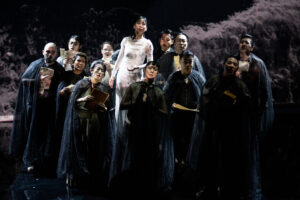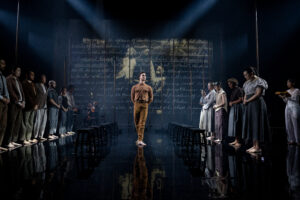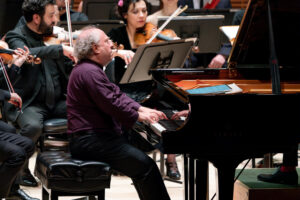
It’s always a family affair with The Knights. The orchestra was founded in 2007 by the brothers Eric and Colin Jacobsen, who share artistic director duties as well as musical positions (Eric is conductor; Colin is concertmaster). Another family connection on the May 16, 2024 program at Carnegie’s Zankel Hall was that of the soloist, the pianist Jeffrey Kahane, for whom his son Gabriel Kahane wrote a concerto. Heirloom, a work which explores music through the lens of several generations of Kahane’s family, received its New York premiere at this concert. Its conventional three-movemennt construct and post-Shostakovich style fit right in with 21st century classical music – especially of the ilk that The Knights often features on its programs. The pianist Jeffrey Kahane was as virtuosic a player as when he burst onto the classical music scene in the early 1980’s as a finalist of the Van Cliburn Piano Competition. He flew through the complex rhythms and flashy runs musically and compellingly, every note a joy to hear. In the first section, “Guitars in the Attic,” G. Kahane explored the colors of the orchestra, from the shining brass to a florid section highlighting double reeds to a whimsical melody played by marimba.
The emotionally penetrating middle movement, “My Grandmother Knew Alban Berg,” alludes to Gabriel’s grandmother’s love for German music and culture contrasting with the terrors of Nazi Germany from which she narrowly escaped. The movement began with a languid trumpet solo in a duet with the piano, and I’m guessing that the solo piano melody was a tone-row (a compositional element at the core of Berg’s style). The center section includes a dense “Brahmsian” theme with a German flair.
The composer looks at life through the eyes of his young daughter in the final movement. “Vera’s Chicken-Powered Transit Machine” (the title refers to a makeshift toy crafted out of an empty diaper carton) included fiddling strings, a playful wood block and muted staccato trumpet. The work’s kickass conclusion was predictable, but that didn’t make it any less thrilling.
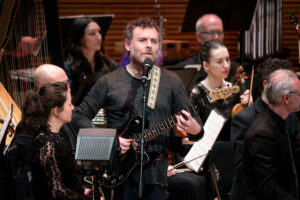
The younger Kahane is more known as a singer-songwriter than as a composer of concert music. He has a compelling voice, both aurally and figuratively. The audience at Zankel was treated to two of his songs, both with the composer as vocalist and electric guitarist, accompanied by The Knights with Mr. Kahane, Sr. at the piano. Where Are the Arms was on the program immediately following Heirloom; and Little Love was a touching encore at the end of the concert.
The program opened with Rhapsody No. 2, a work by Jessie Montgomery heard for the first time in this version for violin and orchestra created by Michi Wiancko. The violinist Colin Jacobsen was the soloist, in complete command of the fiddle techniques that this colorful work required. With Copelandesque chords and jazzy rhythms, the work’s style was unequivocally “American”.
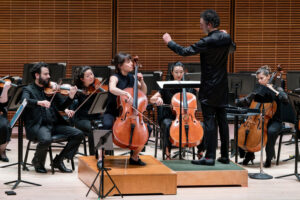
A sumptuous work for cello and strings by Anna Clyne led the second half of the concert. Soloist Karen Ouzounian, a member of The Knights cello section, displayed her gorgeous singing tone on Shorthand, a beautifully lush composition. Clyne’s melodies reference Beethoven’s “Kreutzer” Sonata and Janacek’s String Quartet No. 1, “Kreutzer Sonata.”
The Knights turned to a crowd pleasing and familiar Mozart symphony, No. 31, “Paris”, at the end of the program. The group’s beautiful performance, oozing with musicality, precision and effective dynamic contrast proved their facility with core repertoire as well as newly minted gems.
This was the final concert of the ensemble’s three-program series at Carnegie this season. They’ll return to the Zankel stage for three concerts in the 2024-2025 season, with performances on October 24, February 20, and May 15.
